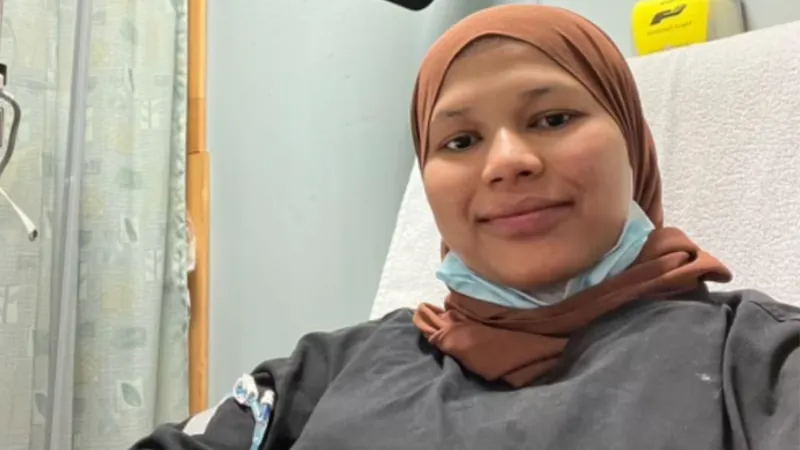
Ontario Mother Battling Rare Cancer Desperately Seeks $15,000-a-Month Treatment: "I Want More Time with My Daughter"
2024-09-23
Ontario Mother Battling Rare Cancer Desperately Seeks $15,000-a-Month Treatment: "I Want More Time with My Daughter"
Noor Ayesha was filled with hope when she discovered she was pregnant again in May 2022. Her first pregnancy had ended tragically—her daughter was born prematurely at seven months and lived only nine hours, leaving Ayesha and her family devastated. Despite her grief, the 25-year-old was optimistic about her second pregnancy. However, five months in, she was taken to a Kitchener, Ontario hospital due to excruciating abdominal pain.
"It felt like someone was stabbing me in my side," Ayesha recalled. "I could hardly breathe."
After undergoing a series of tests and ultrasounds, doctors delivered the devastating diagnosis: stage 4 cholangiocarcinoma, a rare and aggressive form of bile duct cancer that had spread to her liver. Informed that there was no cure, Ayesha and her husband were heartbroken, given the prognosis of only a year to live.
"Finding out I had cancer during pregnancy was really heartbreaking for me and my family. Even the doctor was heartbroken," she expressed.
In a brave fight against her illness, Ayesha began chemotherapy and managed to give birth to a healthy baby girl. Yet, after the birth, her condition worsened under more aggressive treatments that left her drained and unable to care for her newborn. Despite her struggle, the cancer continued to progress.
"It’s hard for me to see my sister go through this," lamented Ayesha's brother, Mohammed Islam. "Every time she comes home from chemotherapy, she’s completely disabled—unable to move or eat. It’s devastating."
However, Ayesha's family learned about Pemigatnib (brand name Pemazyre), a groundbreaking oral medication approved by Health Canada in 2021 for treating bile duct cancers. While the drug has shown promise in slowing cancer growth, its high price of approximately $15,000 a month poses a significant barrier.
Despite its efficacy, the Canadian Agency for Drugs and Technologies in Health (CADTH) has not approved Pemigatnib for reimbursement, citing unclear evidence of its advantages over existing treatments. While provinces like Quebec have moved to cover the medication, Ontario remains hesitant despite lobbying from oncologists who advocate for its funding.
Dr. Rebecca Auer, a surgical oncologist and the creator of the Canadian Cholangiocarcinoma Collaborative, has witnessed the devastating effects of this disease first-hand—her husband was diagnosed with cholangiocarcinoma in May 2022. Unlike Ayesha, they managed to access molecular testing and experimental therapies in the U.S., which tailored an effective treatment plan for his specific cancer mutations.
"My husband is doing amazing, two plus years later; he’s almost disease-free and living a normal life," Auer said. "I wanted to bring hope to others facing this dire outlook."
Meanwhile, Trudy Palozzi, a 76-year-old from Mississauga, offers a glimpse of hope. After facing a disappointing year-and-a-half of chemotherapy, she began taking Pemigatnib in August 2023. Although she initially hesitated to pay out of pocket, encouragement from her husband led her to try the new medication, which has since resulted in a remarkable decrease in her liver tumor size and significant improvements in her quality of life.
"It's extremely expensive, but as my husband says, it's the cost of staying alive," Palozzi shared. "I feel fantastic—I have energy to go for walks and do housework; I'm almost living a normal life."
Despite these glimmers of hope, Ayesha's family faces uncertainties regarding the continuation of her treatment without government funding. To address this, Mohammed has launched a GoFundMe campaign to assist Ayesha in accessing three rounds of Pemigatnib. He is determined to give her the chance to create memories with her daughter, whom she fears may forget her if she doesn’t get the necessary treatment.
“Every moment spent with my daughter is precious,” Ayesha shared, highlighting her emotional struggle. “If I leave her, will she remember me? Will she know that I love her? She is my hope now; I just want a chance to do more.”
As Ayesha's fight continues, the need for accessible cancer treatments and insurance coverage in Canada remains critical. Her story illustrates the urgent need not just for new medications, but also the ethical imperative to make them accessible to those who need them most.









 Brasil (PT)
Brasil (PT)
 Canada (EN)
Canada (EN)
 Chile (ES)
Chile (ES)
 España (ES)
España (ES)
 France (FR)
France (FR)
 Hong Kong (EN)
Hong Kong (EN)
 Italia (IT)
Italia (IT)
 日本 (JA)
日本 (JA)
 Magyarország (HU)
Magyarország (HU)
 Norge (NO)
Norge (NO)
 Polska (PL)
Polska (PL)
 Schweiz (DE)
Schweiz (DE)
 Singapore (EN)
Singapore (EN)
 Sverige (SV)
Sverige (SV)
 Suomi (FI)
Suomi (FI)
 Türkiye (TR)
Türkiye (TR)